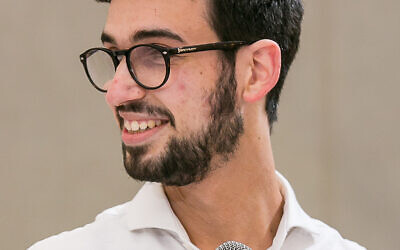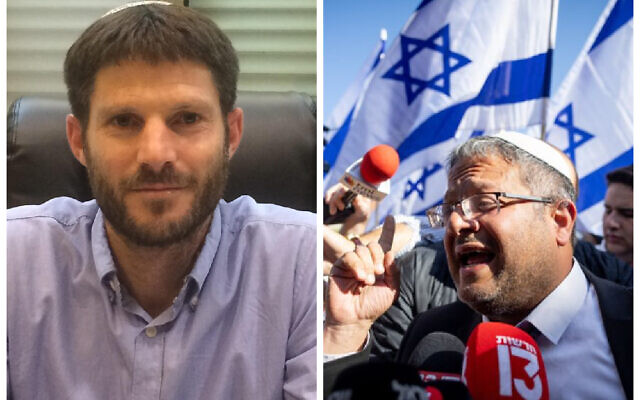OPINION: Israel should take the diaspora seriously when it has something to say
Joel Carmel, who moved to Israel from the UK, on why the rise to prominence of anti-Arab, anti-gay, anti-progressive Bezalel Smotrich and Itamar Ben Gvir was inevitable.
The elevation of Ben Gvir and Smotrich to star status in Israeli politics does indeed deserve all the outrage we can muster, as the front page of last week’s Jewish News rightly demanded.
The UK Jewish community is finally waking up to the reality of Israel’s far-right venture. Last weekend’s editorial, together with the community’s unequivocal reaction to Bezalel Smotrich’s visit last winter, are both promising signs that UK Jewry will not tolerate the kind of overt bigotry and homophobia that Smotrich and his ally Itamar Ben Gvir represent.
But we cannot pretend that any of this was unforeseeable. The fact that Smotrich and Ben Gvir’s “Religious Zionism” party is forecast to become the third largest in the Knesset following the upcoming election is the direct and natural result of years of normalisation of violence and racist tendencies, manifested through the official policies applied in Israel and the occupied territories by successive Israeli governments since 1967, with the near-unquestioning support of the UK Jewish community.

The fact that the sharp rise in violence in the occupied territories – including the deaths of over 100 Palestinians at the hands of IDF forces since the beginning of this year, and the many hundreds of incidents of settler violence (over 100 in the last two weeks alone) – has coincided with Ben Gvir’s rise to prominence on the political stage is no coincidence. Violence and Jewish superiority over Palestinians – the bedrock of Ben Gvir’s ideology – are at the core of Israel’s occupation of the territories.
As one generation of young Israeli soldiers after the next is sent to uphold a system of violent military rule over the Palestinian population and to actively deprive it of basic rights, it’s not surprising that so many of my fellow Israeli citizens have come to internalise the idea that Palestinians on either side of the Green Line simply aren’t equal to us.
We like to talk about the Palestinians’ school textbooks, but we must not forget that this is the education we’ve been giving our own young people for more than half a century now.
I left the home I grew up in in London and came to Israel to join the IDF over a decade ago.
Most Israelis probably wouldn’t even think it’s strange that as we cast our votes (again and again), the millions of Palestinians whose lives we control key aspects of won’t be given any say whatsoever in how they are ruled. In fact, on election day itself, the Palestinians are effectively blockaded as we close the checkpoints (although settlers are still allowed through of course) so that we can celebrate yet another festival of democracy in peace and quiet.
A lot of comments on the Jewish News’s editorial told the newspaper’s editors, in one way or another, that if they want to have an opinion on Israeli politics, they need to earn that right by making Aliyah. I understand that sentiment – it was one of the reasons I myself decided to leave the home I grew up in in London, come to Israel and join the IDF over a decade ago. But one of the many lessons that I’ve learnt since then is the importance of the Jewish diaspora to Israel: to its survival, its ability to flourish, and to its identity.
And for all the energy and resources that Israel puts into courting the support of Jews around the world, and its reliance on world Jewry’s donations and political backing, the least Israel can do is take them seriously when they have something to say.
The UK Jewish community must not wait until the poisoned fruit appears on the tree in order to speak out. Because the problem here is not the fruit, but the trees’ roots: the occupation is the State of Israel’s longest-standing, most heavily invested-in ongoing project since its foundation.
The reality in which two sets of laws apply to two distinct ethnic groups; the reality in which the streets of downtown Hebron, the largest Palestinian city in the West Bank, are segregated and what used to be a bustling market place in now a no-go zone for Palestinians, while Ben Gvir and the other local settlers roam freely; the reality in which Israel’s Supreme Court rules that over 1,300 Palestinians from eight villages have no right to live in the homes their families have inhabited for generations, as the area is to be turned into a military training zone – these are the poisonous roots.
And while it’s obvious to us that we must speak out when politicians who shout hideously offensive slogans against non-Orthodox Jews, LGBTQ people and so many others rise to prominence, we must not forget that as long as those roots exist, it’s only a matter of time until the UK community will have to contend with questions of whether to welcome ministers Smotrich and Ben Gvir when they come on official visits.
Whatever the outcome of this election, it’s not too late for the Jewish community around the world to take a principled stand against the policies that have brought this political reality into being.





Geen opmerkingen:
Een reactie posten